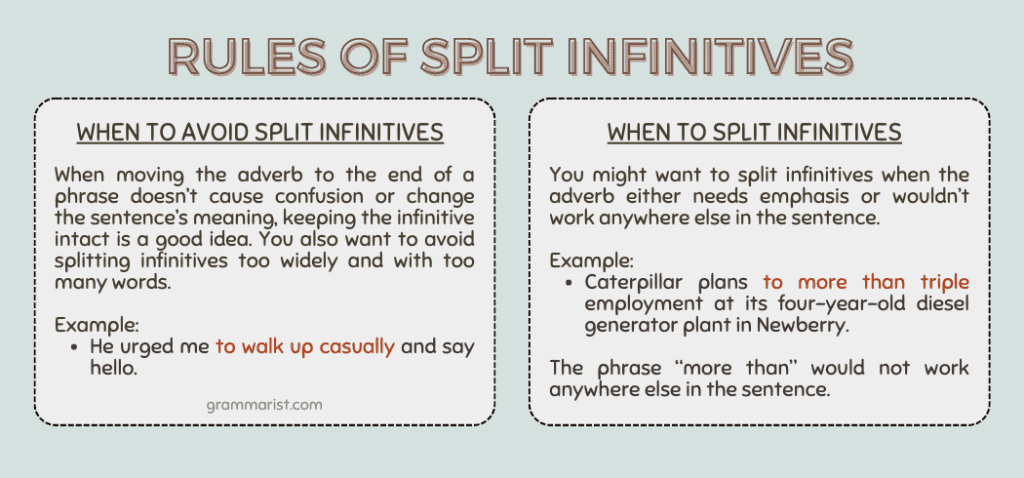Every language has specific parts of speech that help create understandable speech and writing patterns. Grammatical terms are a foundation for learning the English language, and knowing what order to place words in helps language learners become more fluent.
Infinitives are verbs used as a noun or modifiers within a sentence and function to create fluent speech. Split infinitives are a hotly debated subject among grammarians. To split an infinitive means to place an adverb or phrase before the verb to add detail.
Contrary to what some grammarians say, there is no rule against using split infinitives in English. One might use them with care, but splitting an infinitive is sometimes the best way to express a thought clearly.
What Is an Infinitive?
An infinitive is the uninflected form of a verb used as a noun, adjective, or adverb and is placed with the word to—for example, to walk, to inflect, to split. Their use can function as nouns within a sentence (like a gerund).
For example:
- In order to understand, one must first pay attention.
- The students decided to rebel, and each turned in a blank sheet of paper to the instructor instead of their homework.
- Our only hope was to forgive.
- The train from Paris to London was about to leave.
- You have one choice only, to stay.
Infinitives also can work as adverbs and adjectives as a modifier. Adverbs describe a verb, adjective or adverb itself. Adjectives describe pronouns or nouns, such as old, tired, poor or bright.
For example:
- The students showed an unwillingness to cooperate.
- Some people are unable to understand.
What Is a Split Infinitive
A split infinitive is created by placing an adverb or adverbial phrase between the to and the verb—for example, to boldly go, to casually walk, to gently push.
- In order to fully understand, one must first pay attention.
- Our only hope was to sincerely forgive the transgression.
- The plan was to more than triple the employment of the company.
Although some grammarians have widely condemned split infinitives, they’re common in writing of all kinds.
When you’re in doubt, avoiding the split can’t hurt, but don’t ruin a perfectly clear and natural-sounding sentence just to adhere to an arbitrary anti-splitting rule.
Rules of Split Infinitives
Like all grammatical terms, there are some loose rules about split infinitive use. When to avoid them is probably the most important thing to keep in mind.
When to Avoid Split Infinitives
When moving the adverb to the end of a phrase doesn’t cause confusion or change the sentence’s meaning, keeping the infinitive intact is a good idea.
For example:
- He urged me to casually walk up and say hello.
Becomes
- He urged me to walk up casually and say hello.
You also want to avoid splitting infinitives too widely and with too many words.
For example:
- This software allows your company to quickly, easily, and cost-effectively manage all tasks.
Becomes
- This software allows your company to manage all tasks quickly, easily, and cost-effectively.
When to Split Infinitives
You might want to split infinitives when the adverb either needs emphasis or wouldn’t work anywhere else in the sentence.
For example:
- They’re expected to gradually come down in price to about $50 to $75 each.
Placing gradually anywhere else in this sentence (They’re gradually expected…; … come down in price gradually to about… ) would create awkwardness and confusion.
Here’s another example:
- Caterpillar plans to more than triple employment at its four-year-old diesel generator plant in Newberry.
Here, the phrase “more than” would not work anywhere else in the sentence. Try it, and you’ll see!
Let’s Review
Infinitives are verb forms that work as nouns, adjectives or adverbs. They are placed with the word to when functioning properly within a sentence.
A split infinitive is a word between the words to and the verb. Spitting an infinitive helps provide detail and interest to the sentence, and although some people say you should never use the split, there are no grammar rules against its use.
The only time you should avoid the split is when the adverb makes more sense when placed after the infinitive or when there is too wide a split, making the sentence sound wordy and jumbled.


